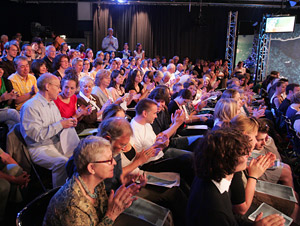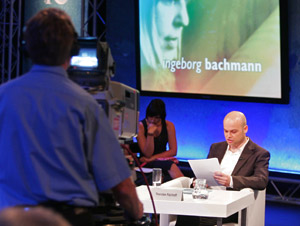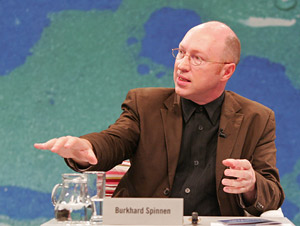
Palzhoff Could Not Convince the Jury
Romania, two and a half months after the death of Ceausescu: "Livia", Thorsten Palzhoff's text about a television crew searching for the identity of a country was not found by the jury to be convincing, especially with regard to the style of language employed.
"His Narrative Style Seems Aimless"
The jury was indeed able to appreciate the "highly political ambition" of the text but could not come to an agreement about the nature of his language. The "anonymous narrative style" seemed to be "lacking in style and inauthentic," claimed Ijoma Mangold, who was responsible for bringing the text to Klagenfurt. According to him, the language was more suited to the kind of reports seen on television.

Alain Claude Sulzer, a new member of the jury, was the first to jump into the deep end. This "examination of the issues of film and film style" reminded him somewhat of films like "Blair Witch Project" or "Dr. Caligari." The camera is the "main character" here and, because of this, his attention was drawn to the "poor style of writing." The author does not "really have a style of his own." The text, in his opinion, just does not cut it.
März: "I would enjoying knowing more about the person behind the "I" "
Ursual März praised the "politically charged scenario" but she did not understand what the author's "position" is. "I would enjoy knowing more about the person behind the "I"." The author's ambition to write about this "great subject" is to be praised but, in the end, the text came across like "a history lesson."

Andre Vladimir Heiz praised the text, saying it was "highly political", but also pointed out that "the text has too much vagueness to it." Klaus Nüchtern was critical of the fact that the text is overly "extravagant." "The enervating self-reflexivity" also bothered him. He also mentioned that there was "too much good in it" and that, "the text tells us the whole time what it is doing." As a whole, the text is, "from a literary perspective, unrewarding."
Ijoma Mangold tried to placate his colleagues. The text is making an attempt to illustrate an idea. It is composed like a novella and it discusses the mythmaking powers of the media (in the sense of Friedrich Kittler). It talks about "world history as a form of media history." As for Daniela Strigsl, she expressed her opinion that it would benefit from "being cut back" because it has "too many things in it that are unnecessary." Palzhoff's language, conditioned as it is by the "transitions typical of media," comes across as "technocratic."

"A Highly Intelligent Construction"
The head of the jury, Burkhard Spinnen, praised the "highly intelligent construction" but the pedagogical impetus of the story put him off. "Once it has become clear what the intention is one then becomes disgruntled about it." The style of the text is "very conventional" and its attributes are unhurried. "Honesty" does not play a role in the text.
Ijoma Mangold tried one last time to defend the text. The language employed was intentionally chosen in order to mimic the "tone of television reports."